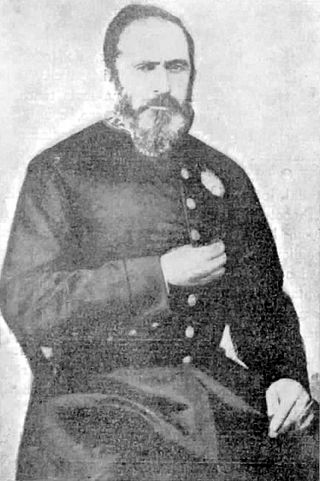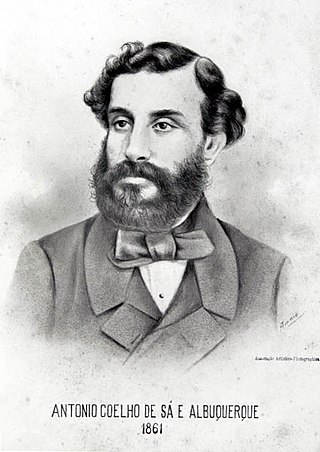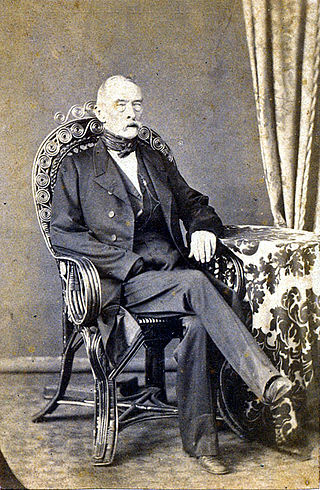
The Paraguayan War,also known as the War of the Triple Alliance,was a South American war that lasted from 1864 to 1870. It was fought between Paraguay and the Triple Alliance of Argentina,the Empire of Brazil,and Uruguay. It was the deadliest and bloodiest inter-state war in Latin American history. Paraguay sustained large casualties,but even the approximate numbers are disputed. Paraguay was forced to cede disputed territory to Argentina and Brazil. The war began in late 1864,as a result of a conflict between Paraguay and Brazil caused by the Uruguayan War. Argentina and Uruguay entered the war against Paraguay in 1865,and it then became known as the "War of the Triple Alliance."

Uruguaiana is a municipality in the Brazilian state of Rio Grande do Sul. It is located on the eastern shore of the Uruguay River bordering Argentina. Opposite to Uruguaiana,and joined to it by a road/railway bridge,lies the Argentine city of Paso de los Libres,Corrientes. North of Uruguaiana lies the Brazilian municipality of Itaqui,connected by a bridge constructed by the British in 1888 over the IbicuíRiver. The municipality also borders the municipalities of Alegrete,Barra do Quaraíand Quaraí,and,also,Uruguay,making it one of the few international triple-border municipalities of Brazil.

JoséMaria da Silva Paranhos Júnior,Baron of Rio Branco was a Brazilian noble,diplomat,geographer,historian,politician and professor,considered to be the "father of Brazilian diplomacy". He was the son of statesman JoséParanhos,Viscount of Rio Branco. The Baron of Rio Branco was a member of the Brazilian Academy of Letters,occupying its 34th chair from 1898 until his death in 1912. As a representative of Brazil,he managed to peacefully resolve all Brazil's border disputes with its South American neighbours and incorporate 900 thousand square kilometers through his diplomacy alone.

Prince Gaston of Orleans,Count of Eu was a French prince and military commander who fought in the Hispano-Moroccan War and the Paraguayan War. He was the first son of Louis,Duke of Nemours and Princess Victoria of Saxe-Coburg and Gotha,and was married to Princess Isabel,daughter of Pedro II of Brazil and heiress to the Brazilian throne.

Luís Alves de Lima e Silva,Duke of Caxias,nicknamed "the Peacemaker" and "the Iron Duke",was an army officer,politician and monarchist of the Empire of Brazil. Like his father and uncles,Caxias pursued a military career. In 1823 he fought as a young officer in the Brazilian War for Independence against Portugal,then spent three years in Brazil's southernmost province,Cisplatina,as the government unsuccessfully resisted that province's secession in the Cisplatine War. Though his own father and uncles renounced Emperor Dom Pedro I during the protests of 1831,Caxias remained loyal. Pedro I abdicated in favor of his young son Dom Pedro II,whom Caxias instructed in swordsmanship and horsemanship and eventually befriended.

Admiral Joaquim Marques Lisboa,Marquis of Tamandaré was a Brazilian admiral of the Imperial Navy of Brazil. He dedicated his life to the Brazilian Navy,including a life-long membership in Brazil's Military and Justice Council,then Supreme Military Court,from its inception until 1891,when the Republican Government granted him leave.

Manuel Joséde Araújo Porto-Alegre,Baron of Santo Ângelo,was a Brazilian Romantic writer,painter,architect,diplomat and professor,considered to be one of the first Brazilian editorial cartoonists ever. He is the patron of the 32nd chair of the Brazilian Academy of Letters.

The military history of Brazil comprises centuries of armed actions in the territory encompassing modern Brazil,and the role of the Brazilian Armed Forces in conflicts and peacekeeping worldwide. For several hundreds of years,the area was the site of intertribal wars of indigenous peoples. Beginning in the 16th century,the arrival of Portuguese explorers led to conflicts with the indigenous peoples;a notable example being the revolt of the Tamoio Confederation. Sporadic revolts of African slaves also marked the colonial period,with a notable rebellion led by Zumbi dos Palmares. Conflicts were fought with other European nations as well –two notable examples being the France Antarctique affair,and a conflict with the Netherlands in the early 17th century over control of much of Northeastern Brazil. Although Portugal retained its possessions during conflicts with other nations,it lost control of the colony after the Brazilian war of Independence,which led to the establishment of the Empire of Brazil.

The Imperial Order of Our Lord Jesus Christ,often simply named Order of Christ,is an order of chivalry instituted by emperor Pedro I of Brazil on 7 December 1822,on the basis of the Portuguese Order of Christ founded by King Dom Dinis and Pope John XXII in 1316–1319.

The Imperial Order of the Rose was a Brazilian order of chivalry,instituted by Emperor Pedro I of Brazil on 17 October 1829 to commemorate his marriage to Amélie of Leuchtenberg.

Manuel Marques de Sousa,Count of Porto Alegre,nicknamed "the Gloved Centaur",was an army officer,politician and abolitionist of the Empire of Brazil. Born into a wealthy family of military background,Manuel Marques de Sousa joined the Portuguese Army in Brazil in 1817 when he was little more than a child. His military initiation occurred in the conquest of the Banda Oriental,which was annexed and became the southernmost Brazilian province of Cisplatina in 1821. For most of the 1820s,he was embroiled in the Brazilian effort to keep Cisplatina as part of its territory:first during the struggle for Brazilian independence and then in the Cisplatine War. It would ultimately prove a futile attempt,as Cisplatina successfully separated from Brazil to become the independent nation of Uruguay in 1828.

Manuel Luís Osório,Marquis of Erval was a Brazilian military officer,monarchist and politician. A member of the Imperial Army at the age of fifteen,he climbed all the posts of the military hierarchy of his time thanks to the soldier attributes that consecrated him as "The Legendary". He participated in the main military events of the late nineteenth century in the Río de la Plata region and is considered a hero of the Paraguayan War. He was declared patron of the Cavalry Branch of the Brazilian Army in 1962.

The history of Pedro II of Brazil in the Paraguayan War began after the invasion of Brazilian provinces by Paraguayan forces by the end of 1864.

The siege of Uruguaiana was an engagement in the Paraguayan War that began in late August 1865,and ended on 18 September that year when the Paraguayans were forced to surrender due to low food supplies. Paraguayan forces surrendered in spite of President López's order to the Paraguayan commander,Colonel Estigarribia,not to do so. After the allied victory at Uruguaiana,Lopéz withdrew his army from Argentina and Brazil.

Joaquim JoséInácio,Viscount of Inhaúma,was a naval officer,politician and monarchist of the Empire of Brazil. He was born in the Kingdom of Portugal,and his family moved to Brazil two years later. After Brazilian independence in 1822,Inhaúma enlisted in the Brazilian navy. Early in his career during the latter half of the 1820s,he participated in the subduing of secessionist rebellions:first the Confederation of the Equator,and then the Cisplatine War,which precipitated a long international armed conflict with the United Provinces of the Río de la Plata.

JoséLuís Mena Barreto was an army officer,politician and monarchist of the Empire of Brazil. He came from a wealthy family with a tradition of military service. JoséLuís entered the army in 1836,during the Ragamuffin War,a secessionist rebellion. The conflict lasted for almost ten years,and he fought in several military engagements at that time.

Martim Francisco Ribeiro de Andrada was a Brazilian politician who played a leading role in the declaration of Brazil's independence and in the government the following years. He was twice Minister of Finance.

Antônio Coelho de Sáe Albuquerque was a Brazilian landowner,lawyer and politician who was notable for being one of the main figures of the Christie Question as well as the governor of several Brazilian states.

The Invasion of Rio Grande do Sul began on June 10,1865 when about 7,500 soldiers under the command of General Antonio de la Cruz Estigarribia invaded the village of São Borja near Brazil's border with Argentina. About 3,000 men commanded by major Pedro Duarte stayed on the other side of the Uruguay River to accompany the advance of the main column. The Paraguayans always advanced along the river without major damage,with the exception of a confrontation on the ButuíRiver where a Paraguayan battalion had been defeated,until they reached Uruguaiana,where a two-month siege made them surrender unconditionally on September 18. The main objective of Paraguayan president Francisco Solano López to invade Rio Grande do Sul was to force a peace treaty favorable to the Paraguayans with the Empire of Brazil. The action took place in the second phase of the Paraguayan War,known as the Corrientes campaign.

João Frederico Caldwell was a Portuguese-born Brazilian marshal and politician who was a military figure during the 19th century. He was known for his extensive career since the Pernambuco revolt and was one of the main leaders of the Paraguayan Invasion of Rio Grande do Sul during the Corrientes campaign of the Paraguayan War.




















